-
FALLEN LEAVES KUOLLEET LENDET (Aki Kaurismäki 2023)
AKI KAURISMÄKII: FALLEN LEAVES/KUOLLEET LENDET (2023)
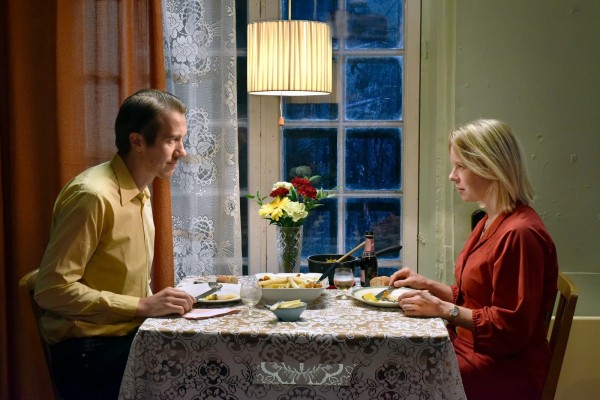
JUSSI VATANEN AND ALMA POYSTI IN FALLEN LEAVES
Two lonely people who meet each other by chance in the Helsinki night and try to find the first love of their lives.
The two people this time are shy, blonde Ansa (Alma Pöysti) and tall, long-faced Holappa (Jussi Vatanen). Both work in factories. Holappa is an alcoholic. The vicissitudes of their tentative, yet somehow determined relationship involve Holappa's reaching a bottom after being fired from a good factory job and then from a not quite so good construction site job and winding up in a halfway house, after which Ansa and Holappa go off, as it were, into the unset. For those familiar with the mechanisms of addiction and recovery, the treatment of this process by Kaurismäki leaves out too much to be of value.
The fairytale simplicity and dry humor that have made Kaurismäki a cinephile delight since the eighties are there. The bright colored images, the somehow engaging dreariness of the urban locations and the karaoke and loud toe-tapping rock and roll music bring the Finnish night to life. But this is a meal that leaves one feeling rather a little hungry, compared to delights like Shadows in Paradise, Ariel, Leningrad Cowboys Go America, The Match Factory Girl, The Man Without a Past, Lights in the Dusk and the more upbeat recent Le Havre and The Other Side of Hope - mainly because of the superficial way Holappa's alcoholism is dealt with, but also a lack of memorable incident. Owen Gleiberman in Variety calls Fallen Leaves "a nice but exceedingly minor movie" that "leaves little imprint." For Kaurismäki devotees this will have to be watched; newcomers should look elsewhere for an introduction to this unique filmmaker. The rapture at Cannes for this film that baffled Gleiberman must be due, we must agree, for the nostalgia that his very consistent style awakens in fans.
The couple's first date goes well as can be expected for two lonely, shy people. After a meal and a film, Holappa asks Ansa for her phone number which she jots on a piece of paper. The paper immediately blows away. They don't know where each other lives and haven't even exchanged names, so they go searching for each other. Holappa stands a long time in front of the retro cinema where they saw Jim Jarmusch's The Dead Don't Die, which she had found hilarious. Ansa waits sadly by her telephone.
Scenes of Holappa show that he is never without a flask and drinks at work and everywhere else, all day long. (Considering this, he seems remarkable free of signs of drinking.) An invitation to dinner chez Ansa is a disaster: it reveals Holappa's heavy drinking to her. She declares that both her father and brother died of alcoholism and she cannot have another drunk in her life. She throws in the kitchen trash the extra table setting she had bought to serve dinner for two.
Through the film there is the thread of music. The first meeting was at karaoke wwhere Holappa was taken by an older friend with a rich baritone voice and a comically exaggerated sense of his own musical talent and prowess with women. Another thread is Russia's war on the Ukraine. Ansa listens to news of it on an old fashioned looking radio on her kitchen table, then shuts it off. A modern note in Kaurismäki's unchanging world is acknowledgement of the existence of computers with internet. Ansa rents the use of one for ten euros a half hour to look for work after being fired from her grocery store job for giving expired food to a homeless person. (No good deed goes unpunished.)
But in Kaurismäki the humble working class drones whose fates are depicted with deadpan tenderness hold out some kind of hope, and the simplicity of the style is a reassuring gesture toward better days. Peter Bradshaw noted that he found himself "rooting for the hero and heroine" in Fa hllen Leaves "in an uncomplicated way" that he hadn't "for any other film at Cannes," and that is another way of seeing how festivals still welcome this movie despite it's not being up to his best. But for me the obstacle to my previous admiration for his work is the too-easy solution to Holappa's alcoholism. This time the director has bitten off more than he can swallow without chewing.
Fallen Leaves/Kuolleet Lendet, 81 mins., debuted at Cannes May 23, 2023. It was screened for this review as part of the New York Film Festival. Metacritic rating: 7̶9̶%̶ 86% (3/14/2024). In France the AlloCiné press rating is 4.1 (=82%).
Last edited by Chris Knipp; 03-14-2024 at 02:22 PM.
-
THE SHADOWLESS TOWER 白塔之光 (zhang lu 2023)
ZHANG LU: THE SHADOWLESS TOWER 白塔之光 (2023)
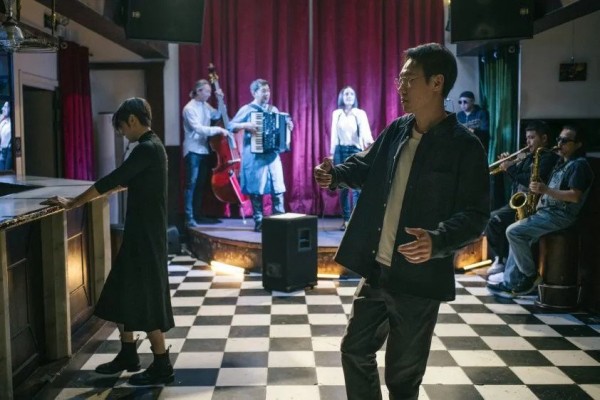
YAO HUANG, XIN BAIQING IN THE SHADOWLESS TOWER
Slow developer
The Shadowless Tower is an ambitious film, striving for a novelistic complexity through a rambling, episodic structure on a limited budget. The writer-director Zhang Lu is Korean-Chinese and grew up in China's Yanbian Korean Autonomous Prefecture, which partly borders on North Korea and Russia. The main character here, however, is thoroughly Chinese in culture and speaks Mandarin but can be amused by Cantonese. Formerly a writer and academic, Zhang Lu was led by film success in the 2000's to become a full-time director. The main action is set in contemporary Beijing, where the ancient "shadowless tower, " a Yuan Dynasty White Pagoda, is a symbol of stability for the protagonist - a middle-aged food critic, divorcee and former poet, Gu Wentong (Xin Baiqing). Preparing an article on a small traditional restaurant, Gu is assisted (evidently not for he first time) by a young woman photographer with the odd name of Ouyang Wenhui (Yao Huang) - a cute gamine type, a little like Faye (Wong) in Wong Kar-wai's Chungking Express with an extra fuck-you vibe. She continually challenges and mocks Gu but he likes it.
Gu may be much older than the girl but he's tall, cuts a good figure, and is a good dancer. His flaw is to be excessively polite, allegedly the cause of his divorce. Ouyang Wenhui is drawn to him and they go on various jaunts.
More of Gu's food critic work might have been interesting; so, of course would be more depth in exploring this odd couple. But as David Rooney says in his review of this film for The Hollywood Reporter, Zhang's people are cut off, "orphaned, disconnected, separated from the roots that give them an emotional and spiritual mooring." Both Gu and his father, Gu Yunlai (Tian Zhuangzhuang), from whom he has been cut off for decades, live alone in small rooms. Since this is the case, the film can't develop any relationships in much depth; it only plots the belated beginnings of them.
Gu also has a small daughter whom he sees regularly. He has arranged, with his wife's consent, for the six-year-old to live with his sister and her husband. She is a smart bundle of joy (known as "Smiley") and leaps into his arms, challenging him (like xOuyang Wenhui?) and showing off - in short, a powerful distraction. The opening sequence - it takes thirty-two minutes to get to the opening title - is a visit to his mother's grave with his daughter, sister, and brother-in-law. Yes, Gu is cut off from his family, just not out of touch with them. He is leading up to finally seeing his father, an old man, of course, who likes to fly kites alone on the beach, an amusement he began at thirty with his son, now practiced alone.
There is a strange scene where Ouyang Wenhui and Gu rub together affectionately standing in a crowded bus, when that is interrupted by a furor over a inappropriate touching of a women by a man who is chased and caught. Ouyang Wenhui and Gu get off and he reveals that his own father was punished for such an act years ago, and in the aftereffect of that, his mother cut off relations with him and he was never seen again. In the aftermath of his mother's death Gu is led to seek out his father after so many years.
Gu has learned that his father has long lived in Beidaihe, a resort town, but working as an "abacus man" (an accountant), he made it a practice twice a year to ride a bicycle - he eschews public transportation - on the long 300-km. distance from there to Beijing to see his two children. His brother-in-law has stuffed a piece of paper into Gu's hand with his father's phone number on it, and this is when he starts calling it from pay phones, but not speaking.
This film about disconnectedness contains neat connections. A link-up with the Yuan Dynasty White Pagoda, comes when Gu's new young girlfriend books a room for them in a hotel that adjoins it. She also connects with both him and his father because he effectively lost his dad at age five, the time when his father was banished by his other. She was orphaned and adopted at age five from Beidaihe, and that is where his father has been living. It's a natural for the girl, who still identifies with Beidaihe despite being raised elsewhere, to go to Beidaihe with Gu [I ]fils[/I] for her to revisit her place of origin and for him to reconnect with his father. To describe this makes it sound contrived, but the plot line unfolds in a way that feels offhand, a process of discovery.
Rooney calls this film a "minor-key drama" and says it's "too muted and elusive to break beyond festivals," but admits that its "melancholy spell" nonetheless "stays with you." It's cunningly but also confusingly constructed; better to watch it twice, or after careful study of a plot summary or press kit. It's interesting, but I can't recommend it to everyone. I will recommend it to any fans of contemporary Chinese film and followers of Asian film festivals. There, Zhang Lu will be a name to watch for.
The Shadowless Tower 白塔之光, 134 mins., debuted at the Berlinale.; also Hong Kong, Shanghai, Beijing and El Gouna (Egypt). It was screened for this review as part of the New York Film Festival where it shows Sept. 30, a North American premiere including an Q&A with Zhang Lu.
Last edited by Chris Knipp; 02-27-2024 at 12:39 PM.
-
IN OUR DAY 우리의 하루 (Hong Sang-soo 2023)
HONG SANG-SOO: IN OUR DAY 우리의 하루 (2023) (2023)
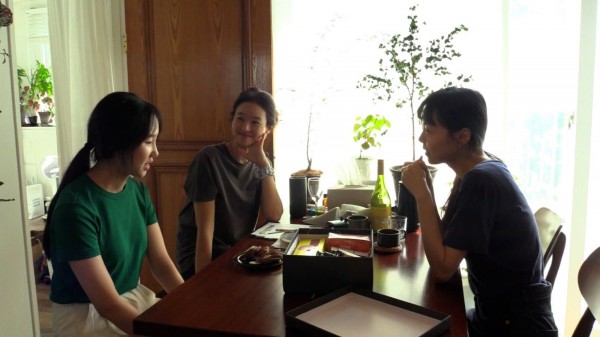
PARK MISOO, SONG SUNG-MI AND KIM HIM-HEE IN IN OUR DAY
Short scenes going back and forth between two situations
A Cannes review calls this film "less substantial and approachable" than the prolific Korean auteur's The Novelist's Film and Walk Up from last year, and called this one "fragile" and "fragmentary." All honor to those Hongists who in the press and intensity of a film festival can find the leisure and calm to contemplate this collection of short episodes in the light of the œuvre and make sense of it, and turn its minimalism and outright silliness and superficiality into profound meaning and art. This writer has tended to come up a bit short.
The spisodes are various. In the first, several women admire and feed treats to a cat and talk about acting as a profession. They are Sangwon (Hong muse Kim Min-hee, an actress who has been out of the country and has lost interest in aacting, and her hostess, Jung-soo (Song Sunmi), whose furry cat "Us" she is admiring. The third woman who comes in later is Sangwon's cousin Jisoo (Park Misoo), who has recently made the decision to focus on an acdting career. Much time is spent on the cat, whom Sangwon over-feeds treat pellets.
In another segment, a grey-bearded poet, Hong Uiji (Ki Joo-bong) talks to a young man, Jaewon (Ha Seong-guk), who has come to interview him while being filmed by a female a arts student, Kijoo (Park Miso)Th. He is having a hard time obeying orders from the doctor due to a heart ailment. He was known for smoking and drinking a lot and now he must give up both alcohol and cigarettes. He and the young interviewer exchange philosophical generalizations.
These two segments are connected through rhyming moments - climbing into single beds, guitars, and consuming ramyen with added red pepper hot sauce, declared to be a delicacy (while the relative lack of nutritional value of ramyen compared to other foods is noted.
Jonathan Romney in his Screen Daily review notes that in Hong sometimes the slightest episodes yield up interpretive riches; that he is playing with structure like a minimalist poet; that the title has no clear explanation except that the segments may all take place in a single day, and that the role of poetry - perhaps diminished - "in our time" is under consideration in the scenes with the poet-sage Hong Uiji.
There are thoughts about life here when the poet and young seeker converse. Also among the actors and would-be actors there arise big questions about art, questions of performance, reality and self-knowledge. These things are deemed to replace an actual plotline, since less is "happening" in the traditional screenplay sense in this film than normally, even for Hong. Nonetheless, devotees will delight in whatever they find here. Skeptics - among whom I count myself at the moment (though I've been all-in for Hong in the past) are more likley to feel this is a sign the Korean auteur ought to cut back on production, and wait till he has more solid material to film. Sometimes a snoert time can seem a long time and sometimes a long time can pass quickly, when it comes to film. For me the reliance on improvisation for material of such slight content led to moments of supreme vapidity.
In Our Day 우리의 하루, 83 mins., debuted at Cannes Directors Fortnight; also Hamburg, Busan, a Paris premiere, and the New York Film Festival, where it was screened for this review. Walter Reade Theater Oct. 11 & 12, 2023.
Last edited by Chris Knipp; 10-21-2023 at 03:57 PM.
-
IN WATER 물안에서 (Hong Sang-soo 2023)
HONG SANG-SOO: IN WATER 물안에서 (2023)

Hong's second film for 2023, 61 mibutes, and intentionally out of focus. A young filmmaker prepares to shoot at an off-season island retreat. Debuted at Berlin.
Last edited by Chris Knipp; 09-24-2023 at 08:52 PM.
-
RADU JUDE: DO NOT EXPECT TOO MUCH FROM THE END OF THE WORLD (2023)

Another tirade from he Rumanian author of the timely and entertaining but scattershot filmmaaker of Bad Luck Banging or Loony Porn (2021). (Locarno.)
Last edited by Chris Knipp; 09-18-2024 at 06:35 AM.
-
CLOSE YOUR EYES/CERRAR LOS OJOS (Victor Erice 2023)
VICTOR ERICE: CLOSE YOUR EYES/CERRAR LOS OJOS (2023)
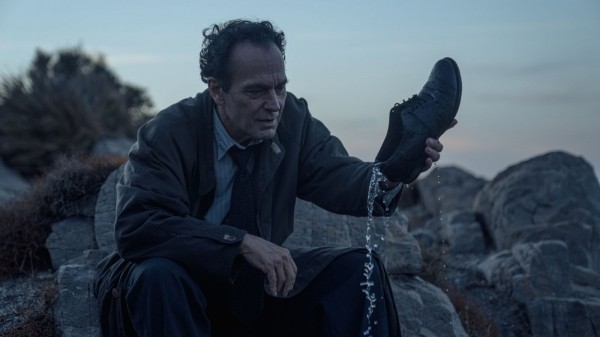
MANOLO SOLO IN CLOSE YOUR EYES
Worlds within worlds; a brilliant late interrogation of memory and cinema
Cerrar los ojos begins with a scene that's deceptive: set in 1947 Paris, it's really a long segment of a film called The Farewell Gaze/La mirada del adiós that was never finished, because its lead actor (Jose Coronado) disappeared. And it's a scene where a big bearded man wearing a turban that's almost a crown - and he refers to "the sad king" and the chess piece of the white king: he's a kind of giant chess piece himself - asks this man to find his lost daughter, who must be 14 now. When the film itself begins it focuses on the search for this lost actor.
So a film within a film with a search within a search. At the end, twenty years later, the director of the unfinished film (Manolo Solo) goes to find the lost actor. The two men were friends. In their youth, they joined the navy together: there is an old photograph in their uniforms, in their "silly hats." The director appears on a TV show about the "lost actor", and when the show appears, someone calls in who recognizes the actor. He is in an "asilo" where she works. The film ends with the director's moving into the "asilo" and attempting to reawaken his lost actor friend's apparently long paralyzed memory. Amnesia seems to have been the cause of his disappearance; or perhaps he disappeared and then got amnesia, we don't know the order of events.
The character in the clip who was sent to find someone "disappears," that is, the actor does. And then he is found. Is the last part of the film real? What is clear is that this work by the noted Spanish filmmaker, member of a generation that included Carlos Saura, itself on the verge of disappearing, represents Erice's first feature film in three decades. What has he been doing? Has he been lost? He does have an unfinished film: there are autobiographical elments in this new, completed one.
Certainly Victor Erice has not lost the gift for resonant cinema he showed in his few earlier notable works - El Sur (1983), The Spirit of the Beehive (1973) and Dream of Light (1992). And in the closing sequence of this film he also focuses on and cherishes cinema. (As pointed out by Jordan Mintzer in his admiring <a href="https://www.hollywoodreporter.com/movies/movie-reviews/close-your-eyes-review-victor-erice-1235498587/">Hollywood Reporter</a> review, Erice's films have always included strong references to "cinema’s powers to captivate and transform," and those are very much present here too.) The early part of the director-investigator's process involves meeting with a librarian of old celluloid film - including the unfinished one. When the actor is found, this custodian is summoned to play the unfinished film in an old cinema near the "asilo." There are a few people in the audience including the lost actor, the director, the TV interviewer, the lost actor's daughter, and others.
This is a specific story, though it is as symbolic and resonant as, say, a short story by Jorge Luis Borges. The whole film is filled with a meditative, sweetly melancholy quality that is very beautiful. Erice moves at his own studied pace. Arguably the early sequences, when the whole situation is being set up, are slow and unnecessarily lengthy; but there may be riches in the Spanish dialogue that elude this reviewer. There is no doubt that the whole builds to a delicate, thought-provoking conclusion. Sadly, this film may be a little too quiet for theatrical audiences. But it will remain as a treat for fans of Spanish cinema, evidently a final, late-arriving cap on the limited but distinguished career of a director who, at 83, may not have another film, since thirty years from now he won't be around.
Close Your Eyes/Cerrar los ojos, 169 mins., premiered at Cannes in its Cannes Première section May 22; also shown at Toronto, San Sebastián, Taiwan and BFI London. Screened for this review as part of the New York Film Festival, where it is shown Oct. 4, 2023. Opened at Film Forum Aug. 23, 2024, coming to California in Sept. Metacritic rating: 86%. (Now risen to 88%, Aug. 2024)
Last edited by Chris Knipp; 08-21-2024 at 01:13 PM.
-
KIDNAPPED/RAPITO (Marco Bellocchio 2023)
MARCO BELLOCCHIO: KIDNAPED/RAPITO (2023)
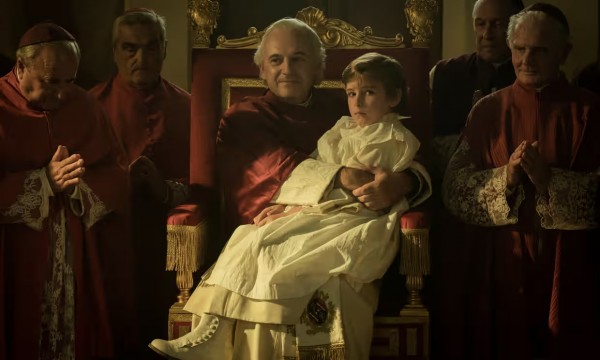
PAOLO PIEROBON AND ENEA SALA IN RAPITO
Bellocchio recounts a true incident when a Jewish child was kidnapped by the Vatican in the 1850's and converted to Christianity. Cannes in competition.
In 1858, in the Jewish quarter of Bologna, the Pope’s soldiers burst into the home of the Mortara family (who appear to be wealthy; and there are seven children). By order of the cardinal, they have come to take Edgardo, their seven-year-old son. He turns out to be secretly baptized by his nurse as a baby and the papal law is unquestionable: he must receive a Catholic education - except whether the Vatican can seize the boy at this age is dubious.
Controlled chaos reigns in these early scenes. The Catholic officials coming first to inform Mortara, making it seem like there is danger, but there can be delays. Then the sudden seizure of Edogardo, the innocent boy.
Edgardo’s parents will do anything to get their son back - but they make one big mistake: they fail to work through the Jewish community of Rome, whose ghetto is the oldest in Europe and one of the largest. This angers the Roman Jews, who in turn anger the Pope.
This incident is almost too good to be true, and Bellocchio makes a spectacular, operatic explosion of images and story out of it that has been called one of his best films - made when he is in his early eighties now.
Bellocchio is one of the great Italian directors since the early sixtes, when he became famous with Pugni intasca/Fists in the Pocket (1965) and China Is Near/La Cina è vicina (1967). He is still making major films half a century later, including the 2019 The Traitor/Il traditore (2019), starring Pierfancesco Favino, about the major witness against the mafia, which was very important in Italy and featured in the 2019 New York Film Festival.
Bellocchio has almost made himself the director of kidnappings, with two memorable examinations of the most notable such event in modern Italian history, the Aldo Moro kidnapping: Good Morning, Night/Buongiorno notte (2003) telling the story from the kidnappers' viewpoint, and a recent TV series treatment in Exterior, Night (2022), where multiple other points of view are represented.
Kidnapped highlights the boy (Enea Sala as a child; Leonardo Maltese as Edgardo in his twenties). But Bellocchio moves around to other viewpoints, frequently focusing on Salomone Mortara, the boy's father (Fausto Russo Alesi) or his aggrieved mother (Barbara Ronchi). Most notably he focuses on the perpetrator of all this, Pio Nono - Pope Pius IX (Paolo Pierobon), who seems sometimes an ogre, sometimes a buffoon, sometimes a fading dictator frantically trying to maintain power. The film is bold in its unflattering depiction of the Catholic Church and bends toward Jewish family liturgy in an unusual way for an Italian film.
The surprise twist of the story of course is that the boy, both bright and cooperative, goes from making the best of his new life in the uniform of the papal school with its flashy big white bow to outright enjoying his new life because he is smart, has a prodigious memory, and becomes the best student. Jesuit teaching may be intensely doctrinaire, arguably brainwashing, bit it is famously full of intellectual stimulation, a magnet for fine minds. Edgardo's "calvary" comes to seem rather like being suddenly sent off to a posh boarding school, with a guaranteed secure future with options of upward mobility: Edgardo will grow up to become a novice for the priesthood in the bosom of the Vatican itself.
Meanwhile the boy's father continues to struggle to oppose this situation, and it is made clear at one point that Edgardo remains distantly ambivalent toward the Pope and never stops missing the warmth of his big family, the rituals of Hebrew chanted en famille morning and night. (Too bad the English subtitles don't indicate what language they're translating, when they go from Italian, to Yiddish, to Hebrew, and to Latin: but this is not the fault of the Italian film.)
As usual with Bellocchio the film is full of chiaroscuro red and black eye candy: it is gloriously visual. A great deal of its operatic style is also due to the grand, surging score by Fabio Massimo Capogrosso.
This was a lengthy time of turbulence in Italy's Risorgimento (1848–1871) whose details will tend to elude all but Italian viewers, since the war between the waning Vatican and secular forces located elsewhere will be unknown to most non-Italians. To fully understand the background of Kidnapped we need to know about that, and the film does provide at least quick background notes with frequent onscreen titles (in big red letters). Is the Pope operating outside the law? we may ask. But the answer has to be "whose law?" since things were not to be sorted out until later.
Rapito is like a string of arias, whose flow never stops till the end. It's a wonderfully satisfying film, not afraid to be conventional - obviously best enjoyed on the big screen in a theater with a good sound system, like that of the Walter Reade Theater at Lincoln Center, where it was presented for the press of the New York Film Festival. To be shown to the public Oct. 3 and Oct. 8 with a Q&A with Bellocchio Oct. 8. Some critics have raved, but the general response has been lukewarm: Jessica Kiang in Variety calls it "just a little too tradition-bound for its own good."
Kidnapped/Rapito, 134 mins., debuted in competition at Cannes May 23, 2023. Also shown at Toronto, Vancouver, BFI London and numerous other festivals including New York, as part of which it was screened for this review. Metacritic rating: 68%.
US release May 24, 2024.
Last edited by Chris Knipp; 05-16-2024 at 12:09 AM.
 Posting Permissions
Posting Permissions
- You may not post new threads
- You may not post replies
- You may not post attachments
- You may not edit your posts
-
Forum Rules





 Reply With Quote
Reply With Quote






Bookmarks